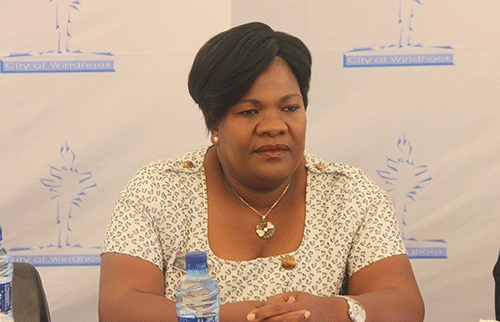Lahja Nashuuta
Diana Kauta
DEPUTY Minister of Rural and Urban Development Evelyn !Nawases-Taeyele has called for the private and public sectors, to work together to mitigate natural disasters risks to break the cycle of poverty and natural disasters.
She said municipalities and other government departments as well as NGOs should get on board in line with the Sendai Framework for Disaster Risk Reduction 2015-2030 goals.
Namibia is among 187 countries which signed the Sendai Framework and agreed to its goals of significantly reducing loss of life and livelihoods caused by disasters by 2030.
The framework, adopted at the UN World Conference in Sendai, Japan on 18 March 2015, calls for dedicated action to be focused on tackling underlying disaster risk drivers, such as the consequences of poverty and inequality.
!Nawases-Taeyele said food insecurity, poverty and inequality were among the most significant challenges facing the majority of Namibians, which in turn have caused calamities and disasters.
“Disaster risk reduction requires an all-of-society engagement and partnership. It also requires empowerment and inclusive, accessible and non-discriminatory participation, paying special attention to people disproportionately affected by disasters, especially the poorest”.
She said the Ministry of Urban and Rural Development, being responsible for local authorities in the country, has over the years contributed to the upliftment of emergency and disaster risk management through infrastructural development, provision of fire-fighting equipment, and capacity-building of personnel.
Echoing the deputy minister’s sentiment was the deputy director at the Office of the Prime Minister, Flory Ashipala, who said the most effective way of addressing disaster risk impacts is by adopting an inclusive, multi-sectoral approach.
“The Disaster Risk Management Continuum/Cycle consists of key phases, namely prevention, mitigation, preparedness, response and recovery. If we are to dissect these phases, you will agree with me that every one of us has a duty or responsibility to contribute towards managing disaster risks,” he added.
Ashipala said this includes the integration of disaster risk reduction into ongoing development, annual plans, policies and strategies to enhance adaptive capacities across all sectors and levels of government.
The Office of the Prime Minister, in close collaboration with regional councils, is rolling out the Commodity and Beneficiary Management Information System (CBMIS).
“This is a transformational system which aims to automate government’s response to disasters by issuing voucher cards to identified beneficiaries in order to redeem their relief food items at local retailers” he noted.
Ashipala reaffirmed the government’s commitment to facilitating the process of ensuring the mainstreaming of disaster risk reduction into all sectors, including the education sector, through continuous engagements, and the induction of regional councils and all other institutions on issues pertaining to disaster risk management.
The duo addressed the International Day of Disaster Risk Reduction (IDDR) in Windhoek’s Goreangab settlement. The day was commemorated under the theme “Fighting inequality for a resilient future”.
Windhoek mayor Queen Kamati said the day is set aside to celebrate how people and communities around the world reduce exposure to disasters, and raising awareness about the importance of reining in the risks they face.
She added that disaster preparedness and resilience-building are important for disaster risk management and reduction, and as such, remains an important priority for the government.
She noted that urban dwellers related to housing as one of the biggest challenges and barriers to the city of Windhoek in its quest to prevent and manage disasters.
Kamati said the council, in partnership with government, has made great strides and provided some decent shelter, especially to those in the lower-income bracket.
-lnashuuta@gmail.com


